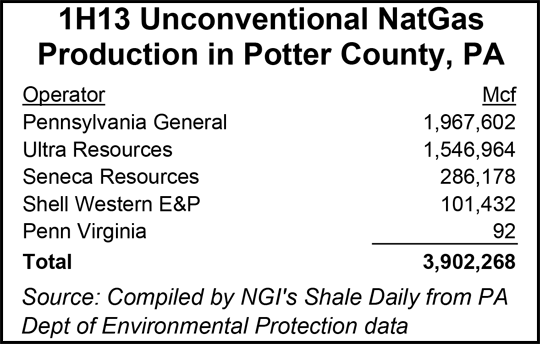Marcellus | E&P | NGI All News Access
Potter County, PA, Wants Better Notification for Water Suppliers
Officials in Potter County, PA, want the Pennsylvania Department of Environmental Protection (DEP) to require that public water suppliers are notified when a permit is issued for oil and gas drilling in delineated water supply recharge areas.

The Potter County Board of Commissioners sent a two-page letter to Marcus Kohl, director of the DEP’s north-central regional office in Williamsport, last week. The county said it wants better communication between the DEP, drillers and municipal water authorities, and to have regulators note any applicable recharge areas during the permitting process.
Although Act 13, the state’s omnibus Marcellus Shale law, increased the required notification for drillers near a source water protection zone from 1,000 to 3,000 feet, county officials told Kohl that “the complicated geology of Pennsylvania requires that a standard be based on each water supply source’s individual characteristics, rather than a blanket generalized distance.”
Paul Heimel, the county board’s vice chairman, said geologists working in tandem with the Triple Divide Watershed Coalition (TDWC) — which represents all of the public water suppliers in the county — have told him that a 3,000-foot distance is not enough.
“Some of these systems draw from an area wider than 3,000 feet,” Heimel told NGI’s Shale Daily on Friday. “The whole basis for this is just to be sure that the energy companies, the drillers, the DEP and the water operators are all fully notified of where these zones are. It’s simply a matter of trying to make the communication among these various parties mandatory.”
Heimel added that there is a perception among the TDWC and others that the DEP “is rather fragmented, and that even the DEP departments themselves may not intercommunicate as well as they should on the issue of these delineated source water management areas.”
Last month, the DEP launched a 60-day public comment period on proposed changes to Act 13 (see Shale Daily, Dec. 13, 2013). The proposals include protecting public resources, identifying orphaned and abandoned wells, improving containment practices and protecting water resources.
According to the DEP’s Office of Oil and Gas Management, regulators issued 10 permits for unconventional gas wells in Potter County in 2013, accounting for less than 6% of the 1,673 total oil and gas permits issued. A separate DEP report showed there were no wells drilled in the county in 2013.
Potter County has 94 unconventional wells, according to a DEP permitted well inventory report. Pennsylvania General Energy Co. LLC and Ultra Resources Inc. are the two biggest operators in the county, owning 31 and 30 wells, respectively. Other operators active in the county include Triana Energy LLC (12 wells), SWEPI LP (6), Penn Virginia Oil & Gas Corp. (5), Chesapeake Appalachia LLC (4), Seneca Resources Corp. (3) and J.J. Bucher Producing Corp. (3).
However, not all of those wells may be active. According to DEP data, only five of those aforementioned companies had any reported production in the county during the first half of 2013.
© 2024 Natural Gas Intelligence. All rights reserved.
ISSN © 2577-9877 | ISSN © 2158-8023 |
